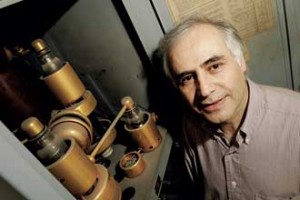
By Laurie Devine
So big you can’t even see it
When many of us think of fossil finds we think big, like dinosaur bones. So, when McGill scientists reported findings of “exceptionally large biogenic magnetic crystals” you think, okay, maybe not quite so big, but big. They must have had some nano-sized picks, chisels and shovels for this fossil find at a dig site in New Jersey, as apparently “exceptionally large” means about four microns long, or, as described in the Science Daily press release, “hundreds would fit on the period at the end of this sentence.” Dirk Schumann, a graduate student at McGill’s Department of Earth and Planetary Sciences, was the first author on the study of the microscopic find, published Oct. 21 in the Proceedings of the National Academy of Sciences. “This is an entirely new class of organism that no one has reported before,” explained Dr. Hojatollah Vali, lead researcher and corresponding author, jointly appointed in McGill’s Departments of Anatomy and Cell Biology and Earth and Planetary Sciences. The “giant” spearhead-shaped crystals found are eight times larger than the previous world record for the largest bacterial iron-oxide crystal. This species of microorganism, explained Vali, lived during a period of abrupt global warming known as the Paleocene-Eocene Thermal Maximum (PETM), when worldwide temperatures rose by 5° to 6° C over a period of 20,000 years. “What’s very interesting is that we know the very specific time frame when these organisms existed,” he said. “If you go below it, we don’t find them, and if you go above it, we don’t find them.” The research might help scientists understand more thoroughly the potential effects of significant changes in the Earth’s climate.
Popular pundit
Antonia Maioni’s name took up a lot of ink in newspapers around the world both pre- and post-Canadian election day. The Director of the McGill Institute for the Study of Canada was in high demand to provide precise predictions before – and erudite comments after – Stephen Harper’s return to power following the Oct. 14 Federal election. Called upon from both inside and outside of Canada, Maioni was quoted by, seen or heard in the New York Times, The Globe and Mail, CTV, Times Online, Reuters and Vermont Public Radio, as well as closer to home in The Gazette, The McGill Tribune and The Daily.
McGill on the tube
First we had Dr. James Wilson, the fictional character in “House”, who (fictitiously) obtained an undergrad degree at McGill. Now, according to the Hollywood Reporter, actor/director/screenwriter/producer Jonathan Prince (The Cleaner, Cane) is working on a McGill-inspired medical drama at CBS, created with producer Elle Johnson (Ghost Whisperer) and story editor Fred Einsman (Private Practice). The show will explore the lives of “college grads enrolled in a medical school with an unusual program that throws them into the trenches at a teaching hospital.” The project was inspired by the experiences of Einsman, who earned a medical degree through a similar program at McGill.
